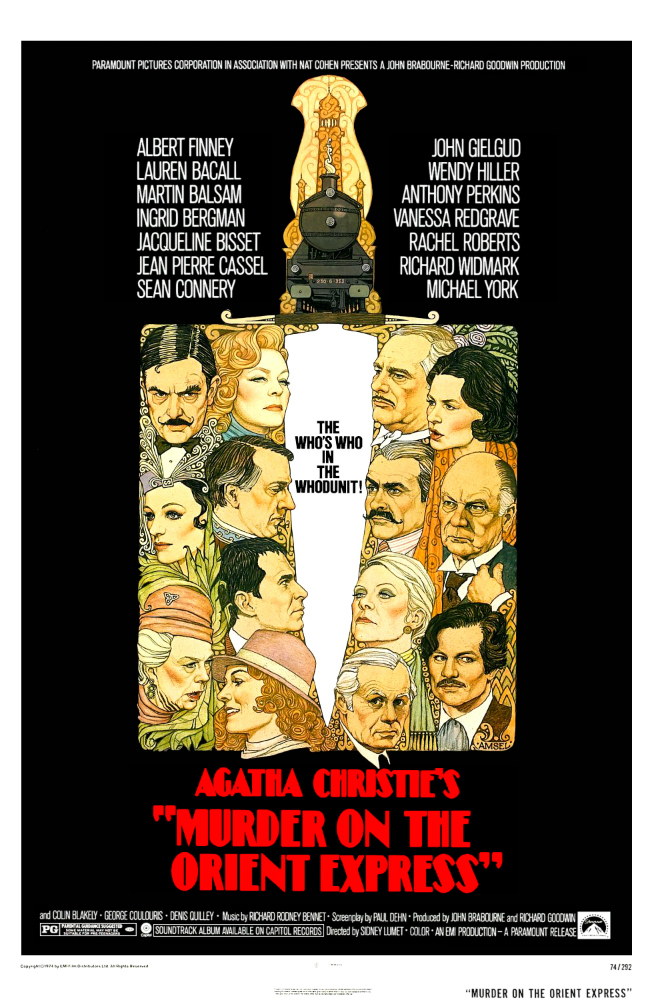
MURDER ON THE ORIENT EXPRESS
(director: Sidney Lumet; screenwriters: Paul Dehn/based on the novel by Agatha Christie; cinematographer: Geoffrey Unsworth; editor: Anne V. Coates; music: Richard Rodney Bennett; cast: Albert Finney (Inspector Hercule Poirot), Lauren Bacall (Mrs. Hubbard), Martin Balsam (Bianchi), Ingrid Bergman (Greta Ohlsson), Jacqueline Bisset (Countess Andrenyi), Jean-Pierre Cassel (Pierre Paul Michel), Sean Connery (Colonel Arbuthnott), John Gielgud (Beddoes), Wendy Hiller (Princess Dragomiroff), Anthony Perkins (Hector McQueen), Vanessa Redgrave (Mary Debenham), Rachel Roberts (Hildegarde Schmidt), Richard Widmark (Ratchett), Michael York (Count Andrenyi), Colin Blakely (Hardman), George Coulouris (Dr. Constantine), Denis Quilley (Foscarelli); Runtime: 128; MPAA Rating: NR; producers: John Brabourne/Richard Goodwin; Paramount; 1974-UK)
“Top heavy with suspects but low on thrills.”
Reviewed by Dennis Schwartz
Sidney Lumet (“The Anderson Tapes”/”Serpico”/”The Offence”) directs in a too heavy-handed manner this whodunit that is top heavy with suspects but low on thrills, while Paul Dehn adapts it to the screen from the 1934 novel by Agatha Christie. It follows the usual Christie well-oiled formula, but comes up short due to the plot’s dull obviousness, the lack of caring about who did it because the vic’s so repulsive and that it’s too unwieldy because the star-studded cast inadvertently step over each other to get movie time and none of their characters are developed. It’s predicated on the Lindbergh kidnapping but replaces them with the Armstrongs, a wealthy American aviatrix couple as seen in flashback as newspaper headlines relay that their daughter Daisy is kidnapped and later found slain.
It’s set in December of 1935 on the famed Orient Express leaving Istanbul for London, with brilliant world-renown Belgian detective Hercule Poirot (Albert Finney) on board; he’s the guest of his friend Bianchi (Martin Balsam), the railroad’s director. Soon the gruff wealthy retired businessman Ratchett (Richard Widmark) is found murdered in his berth while drugged and stabbed twelve times. The detective soon finds out that Ratchett is an alias and he’s really the Italian-American who masterminded the kidnapping of the Armstrong baby and killed it after getting the ransom, who has been on the run since his underling was brought to trial and executed. Bianchi requests that Poirot take the case and that he hopefully solves it before their snowbound train reaches the next stop in Yugoslavia, where it might cause bad publicity for the railroad.
The detective conducts an intense cross-examination of those on the train and finds them all to be suspects. Lauren Bacall is a twice widowed celebrated actress traveling incognito under her married name, who is obnoxious and loquacious; Ingrid Bergman is a Swedish simple-minded nervous missionary worker serving in backward countries to take care of “brown babies” (winning a Best Supporting Actress for something I didn’t see as anything special taking place on the screen); Michael York and Jacqueline Bisset are a haughty wealthy couple of Hungarian royalty; Wendy Hiller is a snobby Russian aristocrat with memory problems; Colin Blakely is an undercover Pinkerton agent; Sean Connery is a dashing English officer returning from India and about to get a divorce to marry his secret lover and travelling companion Vanessa Redgrave; Anthony Perkins is Widmark’s effeminate secretary; John Gielgud is Widmark’s proper man-servant; Jean-Pierre Cassel is the sad-eyed conductor; Rachel Roberts is Hiller’s loyal German maid; and George Coulouris is the train physician.
It’s cumbersome to introduce these 12 or more characters in such claustrophobic quarters as the railway car, and furthermore the intricate plot turns out to be a dud. But it holds some interest because the screen is filled with a talented cast offering vintage theatrical performances and the story is set regally in a bygone era in a style that evokes nostalgia and grandeur.
REVIEWED ON 2/15/2007 GRADE: B-